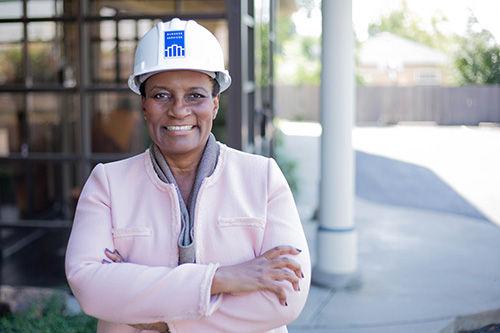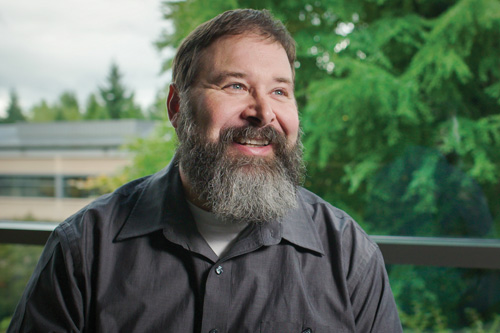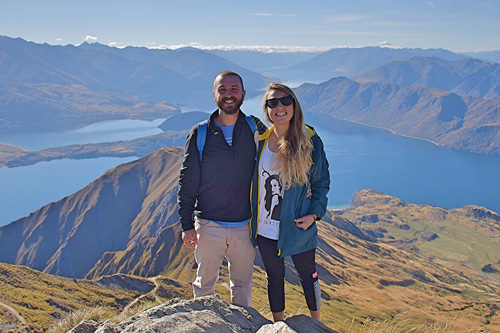How four UNC alumni have taken their careers in unexpected directions with the help of degrees that went deeper than job skills.
By Jason Keller
Have you ever heard of a History major working for Microsoft? An English major traveling the world? A Chemistry major in management? According to a series of surveys and reports from the Association of American Colleges and Universities, 40 percent of recent college graduates hold jobs that aren’t directly related to their college major, and UNC grads are no exception.
“The idea that college is here to prepare you for the world of work has been heightened since the recession,” says UNC Director of Career Services Renée Welch. She says that a job is a side effect of higher education. Welch, who has a master’s degree in College Student Personnel from Miami University in Oxford, Ohio, and a bachelor’s in Chemistry from Millikin University in Illinois, said that it was an internship in a clinical lab that led her to a moment of growth — and a change of heart.
“I did an internship through the National Science Foundation with research in a physical chemistry lab, and realized I didn’t like it,” she says. “I started to identify that for myself, I would prefer a work environment where I could be interpersonally connected to other people.”
This, Welch says, is what she believes to be part of the real purpose of higher education — experiences that help students understand themselves and what they’d like to do after they graduate. According to Welch, college gives students not just the skills for the job market, but the experiences to help them know where to best apply their skills.
Finding that path — no matter where it takes you — is part of a UNC education that goes beyond skills to experiences. It’s an education that serves you well throughout life and allows you to “pivot” from one field to another, as these UNC alumni discovered along their career paths.

Journalist’s Skills as a Business Owner
When you first walk into the office of Burgess Services, a Denver Construction firm, you’re directed toward a waiting room with two chairs, divided by a small table stacked with magazines. Take a closer look, and you’ll see that the covers show the portrait of a tall woman with an easy, self-assured smile. The magazines are stamped with mastheads such as ColoradoBiz, Altitude, Construction and Design, Business Altitude — all prominent business magazines in Colorado and beyond.
Denise Burgess, owner of Burgess Services, appears on the covers of those business journals. The 2017 Chair of the Denver Chamber of Commerce, she is also a UNC Journalism alumna.
She speaks with exuberance, confidence, and a Zen-like peace that she’s picked up through experience and from her father, Clyde Burgess, who started Burgess Services in 1974.
In her daily work in the construction world, Denise approaches complex discussions among clients, engineers, water specialists, crew managers and more, like a journalist. She listens with interest, asking concise questions and stripping back the excess language to make sure everyone is on the same page. Her style is personable and casual, yet professional — something she says her upbringing and her undergraduate education at UNC helped instill in her.
When Denise was at UNC, the journalism program was housed in Kepner Hall, with business and journalism professors using the same classrooms.
“All of my friends were business students, so that really kind of got me into the mindset that ‘I want to take these classes,”’ she says.
Denise says most professors fostered an environment of conversation and friendliness, and it was a culture that enabled her to grow her communication skills, keys to her growth as an entrepreneur and business leader.
“The best thing about a UNC education is that it allows you to pivot,” she says. “And this is a great thing for an entrepreneur, because you can have a journalism degree and successfully run a construction company.”
After graduating in 1982, she interned at Denver’s Colorado History Museum and soon became a full-time employee, then worked in sales for a California radio station.
When she moved back to Colorado, she helped market Burgess Services, eventually joining the business in 1994. She worked alongside her dad, picking up his business sense and interpersonal skills, as well as a certificate in construction management from the University of Denver. As the business grew, Denise took on more responsibility for the company.
After Clyde passed away in 2002, Denise carried his work forward and expanded it to include national contracts and awards. Her father’s sense of wisdom and grace was something she never lost, even when her managers quit after her father’s passing, saying that a woman couldn’t run a construction company.
“I understood. It was difficult, and they had other job offers on the table,” she says.
Though she describes those days as pure panic, she saw longtime competitors and partner firms coming together and asking how they could help her — not as a business move, but as an act of kindness.
“I had people come up to me at my father’s funeral — people I’d never even met — and they’d thank me because my father had done something kind for them,” she says.
Her father didn’t just build construction projects, he built relationships and a business — and he helped Denise build on her UNC education. If her journalism degree taught her about transparency, communications and adaptability, it was her father who guided her along the way.
That’s reflected in the awards and publications she’s been honored by, the business going on 44 years of growth, and her volunteer work with young women of color in the STEM field. And that confident exuberance? It comes in part from knowing that no matter which path she follows, she will always have the skills she needs to meet challenges head-on.

Making a Difference through Disaster Relief
While most people have probably heard of Microsoft, they may not have heard of its Disaster Response and Humanitarian Services Department.
Lewis Curtis, the department’s director and a 1992 UNC History grad, says the department’s work is “about helping agencies in their time of need, for free.”
Lewis, whose department has led more than 170 missions in 31 countries, says that “when agencies are in despair, when they’re suffering, we bring in all engineering resources and talent and software and capabilities to help them reduce human suffering, to help them stabilize the area, as fast as possible.”
In April 2015, after an earthquake in Nepal killed nearly 9,000 people, Lewis’s team worked to help rebuild the country’s school system, developing a tracking system that helped them determine which children were orphaned and which administrators and teachers were affected, as well as identifying facilities and vehicles that were destroyed.
It’s one example of the far-reaching work his department does. So how did someone with a degree in history find himself so deeply involved in disaster relief?
Lewis chose to study history because he wanted to improve his reading and writing skills. And he did. But what he gained beyond that was something unexpected. “At UNC, it wasn’t about getting the technical skills to get a job,” he says. “It was about learning how to think, and learning how to live and explore and how you invent the role you’re called on in life. And that’s what UNC was wonderful about.”
His professors were a big factor in expanding his understanding as he studied for his degree, he says. “I’d get into those history classes where professors tell you, ‘It’s not about the answers that you try to regurgitate, it’s the questions you choose to answer that make a difference in history, and how you look at the world, and how you make a difference in this world. And (it’s about) those questions that will guide your decisions.’ ”
That depth of exploration and critical thinking is something that has impacted Lewis’s career. Directing disaster relief efforts for Microsoft in some of the world’s most deprived and desolated disaster zones takes critical thinking, planning, communicating and, most of all, empathy.
“I had a professor who pushed me to do a research project. I did research on Kurdish refugees and flew out to Ontario to spend time with Kurdish refugees from the mustard gas attacks during my Christmas break. It was incredibly moving,” he says. “The empathy and understanding from that experience, it has helped me to this day. How you have empathy, how you look at a society — that didn’t come from an MBA class, it didn’t come from Microsoft training, it came from UNC.”
Lewis’s work has taken him around the globe, whether his team was working with the World Health Organization to respond to the Ebola outbreak, helping after Hurricanes Harvey, Irma and Maria, or analyzing information for how to get resources for Syrian refugees for the largest refugee camp in Jordan.
“Look at the students at UNC. They’re givers, they’re helpers, they’re people who want to do something for the world, and they want to be teachers, they want to be social workers. UNC is a whole school of givers,” he says. “How can you not be inspired by that?”

Finding Home (and Careers) in a Backpack
When Rose Hedberg graduated from UNC in 2014 with a degree in English, she had one question: “What happens next?”
She knew she wanted to write for a living but didn’t know how to get started. She also wanted to travel, inspired by a semester abroad in Ireland her junior year. But she felt adrift after she graduated.
“It’s not quite the guarantee after graduation that others experienced. I wasn’t limited to just one thing like nursing or teaching,” she says of her humanities degree. “Theoretically, I possessed a skillset for any field. I needed to narrow my pursuits to one.”
For three years, she worked for a local publication then moved on to work at Romas. Then she and her now-husband, Thomas Brath, 2014 UNC Theatre Arts alumnus, made a life shift.
In 2016, Rose and Thomas sold most of their belongings, packed what remained into two 65-liter backpacks, bought one-way tickets to South America, and planned to write about and photograph their travels along the way
Their backpacking tour of South America, New Zealand, Asia and Europe, was set to last a year before they returned to the states. But the 12-month mark came and went, and they still hadn’t come home. That’s because “home” became an 8-by-8 foot shed in New Zealand for three months, a yurt in Colombia, tents in Peru, as well as vans, motorhomes, hostels and homestays.
“We’ve made a home out of the world because we know our needs, our comforts, and we know the importance of engaging with the community. Colorado will always be where we’re from, but for us, home doesn’t have to be confined to one place,” Hedberg says.
At the moment, she and Thomas are living in Da Nang, Vietnam. She works at The American University there as associate director of communications. Thomas teaches at an international school nearby.
“Having my bachelor’s degree was pivotal, she says. If I didn’t have my degree, I don’t think I would have ever been a candidate for hire. Working in a university, people want to understand that you’ve gone through the educational process. That you can understand the system.”
The American University in Vietnam is also where Rose and Thomas met three other UNC alumni, most notably Maynard Yutzy.
Yutzy first went abroad in 1968 and has spent his life teaching in Japan, China, Guam, and all over the United States. Now, he’s the vice principal of The American University’s attached elementary school and holds a master’s in education from UNC.
“Be honest with yourself, be introspective and listen to your emotions. Keep expanding your experiences and you’ll land on something you love,” Yutzy says.
It was his advice that helped Rose overcome challenges to writing.
“Being able to write fluidly was difficult before traveling” she says. “I knew that writing was easy if you were passionate about the subject, but I hadn’t discovered my love for storytelling and so writing in between college and traveling the world was awkward. My writing felt forced.”
When she found her passion in travel, the writing came easier, and just like her hike up the 15-thousand-foot Laguna 69 in Peru, she had finally reached the summit and could move in any direction.
“Leaving the USA was a mad dash for adventure, but it was also an unknown experiment in creativity. Our world trip was the ideal environment to flourish as a writer. On the road, inspiration was never lacking,” she says.
And for Rose and Thomas, that inspiration is reflected in their professional travel blog, scratchmypack.com, as well as in Rose’s own short stories. Thomas does freelance photography, capturing their life abroad, from mountain treks to mad dashes through cities. You can find much of his work illustrating Rose’s stories on their blog.
“I think I am definitely taking full advantage of doing things that make me happy,” Rose says, “some that might be ‘living the dream.”
Editor’s note: Author Jason Keller worked for UNC’s Office of University Relations for more than a year until his graduation this December with a degree in Journalism. We will miss his outstanding writing skills and high energy initiative, and can’t wait to see where his path as a UNC alumnus will take him.

